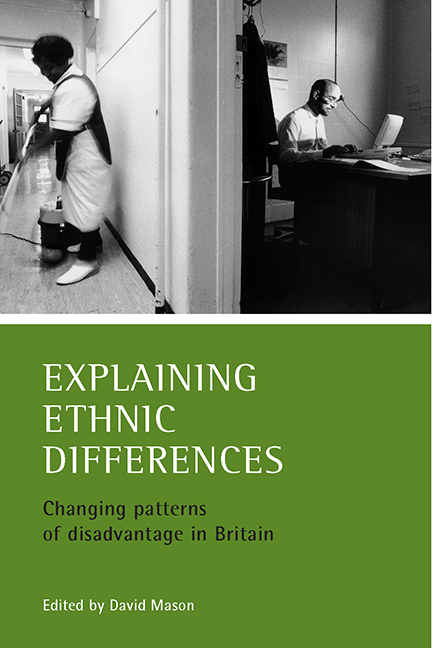Book contents
- Frontmatter
- Contents
- List of figures and tables
- Foreword
- Notes on contributors
- one Introduction
- two Changing ethnic disadvantage: an overview
- three The demographic characteristics of people from minority ethnic groups in Britain
- four Ethnic differentials in educational performance
- five Changing patterns of ethnic disadvantage in employment
- six Patterns of and explanations for ethnic inequalities in health
- seven Housing black and minority ethnic communities: diversity and constraint
- eight ‘All the women are white, all the blacks are men – but some of us are brave’: mapping the consequences of invisibility for black and minority ethnic women in Britain
- nine Police lore and community disorder: diversity in the criminal justice system
- References
- Index
seven - Housing black and minority ethnic communities: diversity and constraint
Published online by Cambridge University Press: 20 January 2022
- Frontmatter
- Contents
- List of figures and tables
- Foreword
- Notes on contributors
- one Introduction
- two Changing ethnic disadvantage: an overview
- three The demographic characteristics of people from minority ethnic groups in Britain
- four Ethnic differentials in educational performance
- five Changing patterns of ethnic disadvantage in employment
- six Patterns of and explanations for ethnic inequalities in health
- seven Housing black and minority ethnic communities: diversity and constraint
- eight ‘All the women are white, all the blacks are men – but some of us are brave’: mapping the consequences of invisibility for black and minority ethnic women in Britain
- nine Police lore and community disorder: diversity in the criminal justice system
- References
- Index
Summary
Introduction
The housing experiences of minority ethnic households are very varied, and negative stereotypes of segregation into so-called ‘ghetto’ life tell us little about the meanings or shifting characteristics of home and community. Diverse trajectories have become more visible in recent years between and across specific minority ethnic groups, and there are many housing success stories. Yet there is also a continuity of shared disadvantages for communities, affecting opportunities, resources and housing choice. Furthermore, patterns associated with socioeconomic differentiation, gender and disability may cross-cut or reinforce those associated with ethnicity.
This chapter draws on a review commissioned in 2001 by the then Department for Transport, Local Government and the Regions, designed to appraise the evidence base in the field of housing for black and minority ethnic households in England (Harrison with Phillips, 2003). In reviewing the ‘state of the art’ for housing research, we noted the richness and extensiveness of existing empirical materials, but also many gaps in knowledge. Analysis by policy makers and scholars has often relied on anecdotal or very localised findings. This is partly because housing conditions and decisions are so complex and particular, and large-scale surveys can rarely cater for the detail. Not only do dwellings vary in age, affordability, type and tenure, they are the focus for activities by a wide range of organisations in private and non-profit spheres, with local and regional variations in markets, costs and capital values. The housing options open to people from a specific minority ethnic group may differ from place to place, reflecting factors such as house prices or the availability of social rented dwellings, as well as labour market opportunities. Thus, differences in location can connect to differing patterns in the housing circumstances of specific minority ethnic groups. For instance, Howes and Mullins (1999) have noted that, while Bangladeshi people in London were found to be particularly likely to be council housing tenants (58%), this appeared much less the case for those living elsewhere in Britain (only 15% of whom were apparently local authority tenants). At the same time, housing supply complications may be paralleled by variations in household circumstances and strategies linked to gender, community or settlement histories, religious or kinship affiliations, age, disability, health, or incomes. Thus, the housing scene is a highly complicated mosaic of varying conditions, resources and opportunities.
- Type
- Chapter
- Information
- Explaining Ethnic DifferencesChanging Patterns of Disadvantage in Britain, pp. 105 - 120Publisher: Bristol University PressPrint publication year: 2003



